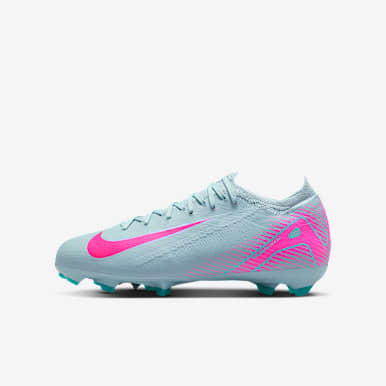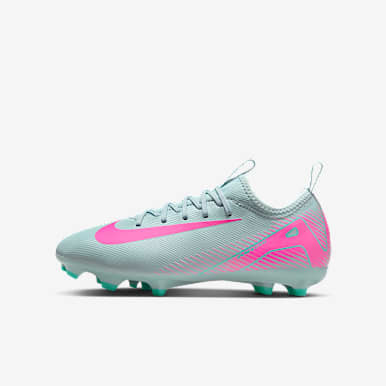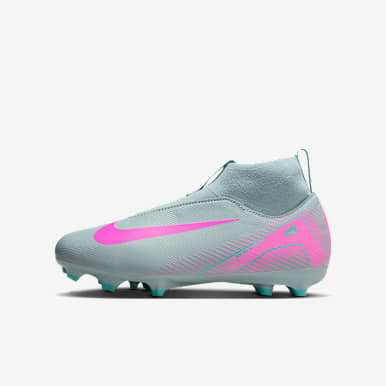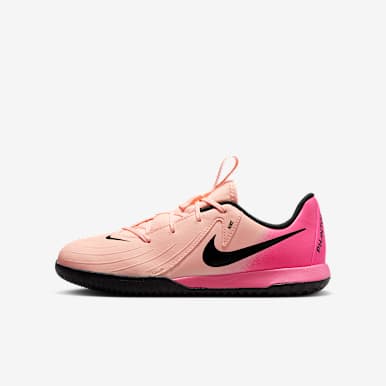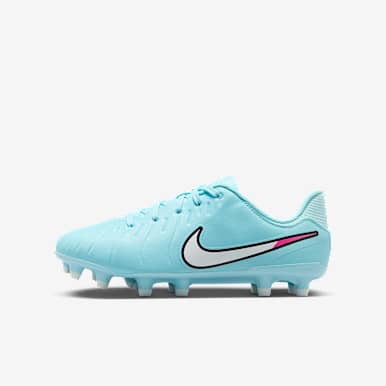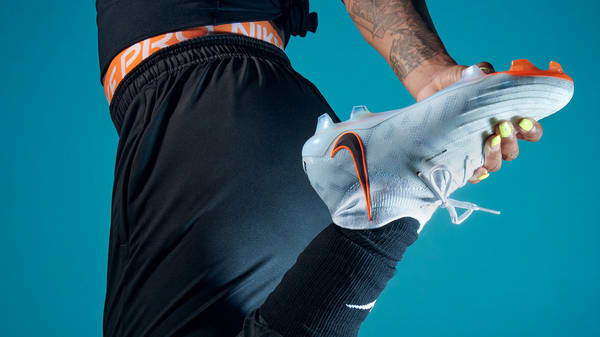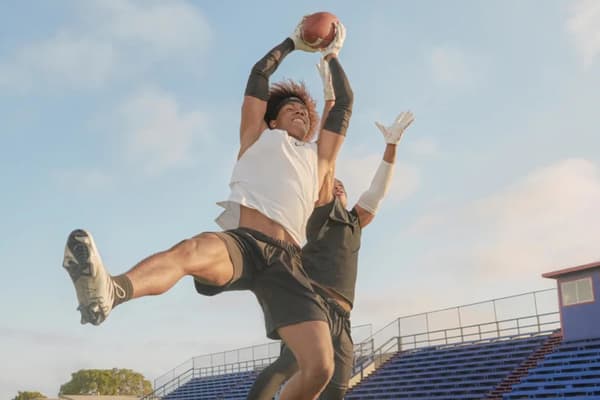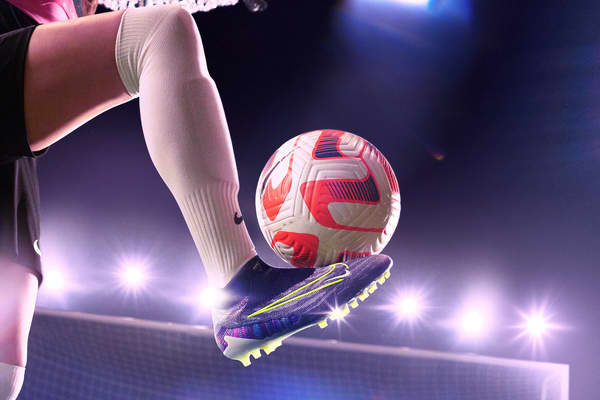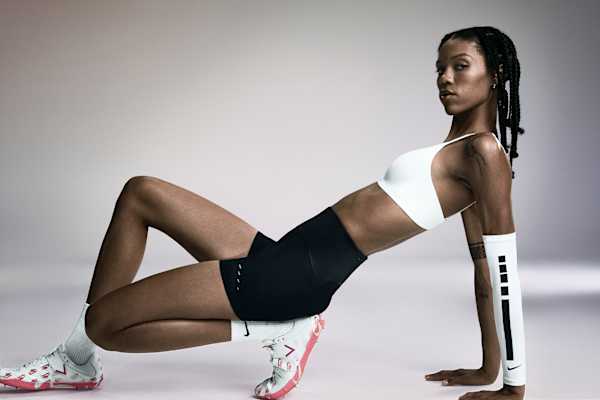How to Choose the Best Nike Soccer Cleats for Kids
Buying Guide
Find the cleats that will best fit their taste, comfort and style of play.

A pair of soccer cleats optimized for comfort and playing style can help the child in your life get the most out of the sport while performing at their best. When finding a new pair of soccer cleats for kids, there are some important factors to consider, such as the type of surface they’ll be playing on, their future performance goals and the cleat materials they find most comfortable.
Use this guide to find the best kids’ soccer cleats by Nike.
(Related: The Best Nike Soccer Cleats to Match Your Playing Style)
Quick Tips
- Consider the child’s playing level: For a beginner, consider a basic style, such as the Nike Jr. Tiempo cleats. More experienced youth players may benefit from cleats that maximize performance, such as the Nike Jr. Phantom or Mercurial cleats.
- Prioritize comfort and fit: Soccer cleats should feel snug but not too tight. There should be no movement in the heel and a space about the width of a thumb between the big toe and the edge of the cleat. A soccer cleat will generally fit true to regular shoe size. Picking a cleat with Nike Zoom Air cushioning will provide a more comfortable fit as well.
- Know the playing surface: Most cleats are made for a specific surface, whether that be firm ground (FG), turf (TF) or indoor courts (IC). If the little soccer player in your life will most likely play on a variety of surfaces, opt for a multi-ground (MG) cleat.
(Related: How To Pick the Right Indoor Soccer Shoes for You)
The Best Soccer Cleats for Kids, Based on Playing Style
1. For Comfort and Speed: Nike Jr. Mercurial
Mercurial cleats are made for young players who prioritize support and comfort while dribbling, passing and kicking.
The Mercurial features a synthetic upper that molds to a kid’s foot and provides a snug fit and responsive touch. These cleats are flexible and breathable, making them ideal for intense bursts of speed on the field while maintaining control of the ball.
Some Mercurial boots come with Nike Zoom technology, which helps absorb impact and adds cushioning to quick movements. Nike Jr. Mercurial Vapor cleats have a low-profile design, while the Nike Jr. Mercurial Superfly boots feature a sock-like lining that wraps the ankle for a natural, close-fitting feel.
Find these soccer shoes for firm ground, turf, indoor courts and multi-ground surfaces.
2. For Precision and Control: Nike Jr. Phantom
The Phantom cleat is designed with extra grip for young players who are building their footwork skills like fast turns, accelerated moves and precision for kicking the ball to the back of the net.
Synthetic leather and asymmetric lacing gives a clean touch zone on the inner arch of the cleat, while a blend of conical and tri-star studs underfoot enables quick directional changes. Meanwhile, a supportive mesh collar gives comfort and breathability.
Some models, like the Nike Jr. Phantom Academy, don’t have laces at all but rather, a pull tab and adjustable tongue to get young players on the pitch even more quickly. These cleats also feature an agility plate designed for swerves and sprints.
Like the Mercurial cleats, Phantom cleats feature either a sock-like fit at the ankles or a low-profile style. Find them for turf, indoor courts and mult-ground surfaces.
3. For Reliability and Durability: Nike Jr. Tiempo
The Nike Jr. Tiempo cleats favor comfort and consistency above all else. This style embodies traditional Nike designs, and its reliability makes this cleat work well for all players — from beginner to expert.
These soccer shoes are best suited for defenders, center backs or players who want more protection. The upper on these cleats has raised textures backed by soft foam pods to give padding and precision to dribbling, passing and shooting.
Soft, synthetic leather adds to the shoe’s durability without sacrificing comfort. These cleats feel comfortable from the start, meaning the young player in your life can go straight to the field without a painful break-in period. Find them for turf, indoor courts and mult-ground surfaces.
(Related: How to Clean Soccer Cleats)
Frequently Asked Questions
What type of cleats should I choose for a child just beginning soccer?
Look for basic cleats with a rubber or plastic sole for good traction on the field. The Nike Jr. Tiempo cleat provides a comfortable fit and reliable traction that works well for beginners and experts alike.
How should cleats properly fit a child’s foot?
Soccer cleats should feel snug but not tight. The child should be able to freely move their toes, but their heel should stay put. Avoid buying cleats that are too big, as this can make it harder for a player to control the ball and potentially cause blisters.
What type of cleat is best for different types of playing surfaces?
Cleats are made for specific surfaces, such as firm ground, artificial turf or indoor courts. Soccer shoes worn indoors will have a grippy, rubber sole, while cleats worn on multi-ground surfaces will have studs on the bottom for traction and quick movements.
How often should I replace a child's soccer cleats?
Replace soccer cleats every six to eight months or when the child outgrows them. Cleats may need to be replaced sooner if they show signs of wear and tear, such as worn-out soles or holes in the uppers.
Words by Claire Tak
